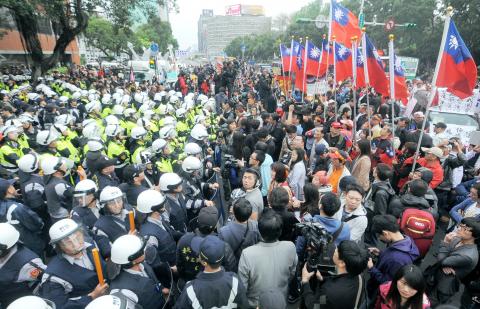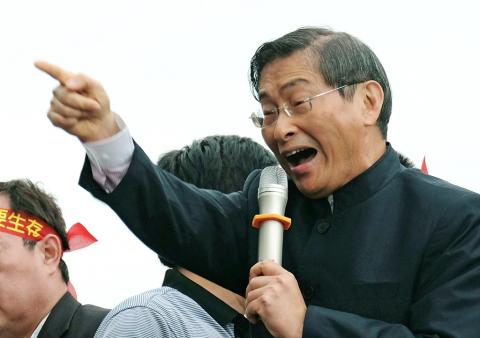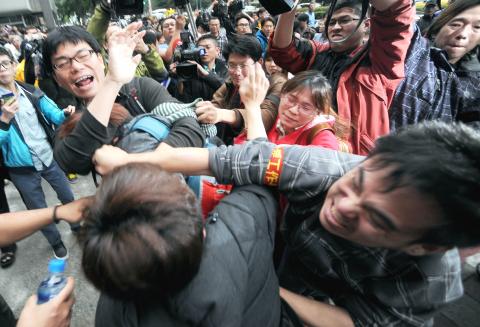Former gang leader Chang An-le (張安樂), who heads the China Unification Promotion Party, led hundreds of people to the streets near the Legislative Yuan in Taipei yesterday to demand that the students who have been “illegally” occupying the legislative chamber “return the legislature.”
Chang, known as the “White Wolf,” said on Monday that he would not take part in yesterday’s counter-protest, but he did not explain his change of heart yesterday.
He said the two main student leaders, Chen Wei-ting (陳為廷) and Lin Fei-fan (林飛帆), were “employed students,” a phrase coined during the Martial Law era to refer to students who worked for the Chinese Nationalist Party (KMT) regime to spy on their peers and report any “unlawful” action against the state.

Photo: Wang Min-wei, Taipei Times
Chen and Lin led hundreds of students in the occupation of the legislative chamber on March 18. The student protesters, who have grown into the Sunflower movement, are demanding that a mechanism to monitor cross-strait talks be established before legislators resume their review of the controversial service trade pact with Beijing.
Accompanied by two student members of the pro-unification New Party — Wang Puchen (王炳忠) and Lin Ming-cheng (林明正) — Chang and his supporters engaged in an hours-long standoff against supporters of the Sunflower movement at one end of Zhengjiang Street, with scores of policemen acting as a buffer between the two sides.
Chang and his group criticized the police for being “blind to the criminal activities” inside the Legislative Yuan, while blocking “law-abiding citizens” from entering the building, “which belongs to everybody.”

Photo: Sam Yeh, AFP
One woman called the students in the legislative chamber “green guards” who were being directed by the Democratic Progressive Party.
At one point, Chang, apparently upset by pro-Sunflower supporters calling him a gangster, angrily shouted: “You are all fucking offspring of Chinese, but you do not deserve to be Chinese. Chinese people do not want you.”
The students responded with applause and laughter, with many shouting: “We are not Chinese anyway. We are Taiwanese.”

Photo: Liu Hsin-de, Taipei Times
Thousands of students supporting the Sunflower movement gathered outside the Legislative Yuan — mostly along Qingdao E Road — to protect those inside.
They responded to Chang and his protesters by singing Island’s Sunrise (島嶼天光), which has become the Sunflower movement’s anthem, and chanting: “Retract the cross-strait service trade agreement” and “Safeguard our democracy.”
Mocking Chang, who allegedly paid for “walkers” to join his demonstration, the students said: “We do not need ‘employed walkers’ to protect democracy.”
Hearing that Chang’s group was asking to meet with student representatives to deliver a petition, Fu Jen Catholic University philosophy professor Shen Ching-kai (沈清楷), who was outside the legislature, said the pro-pact demonstrators were directing themselves at the wrong people.
“Should not those in power be the ones held accountable for people’s complaints?” he said.
Responding from the legislative chamber, Chen said that Chang and his group should be appealing to the Presidential Office, not the anti-pact students.
“The president and the lawmakers are the people who have the real power. The question is not to ask us when are we leaving the Legislative Yuan, but when these people will begin to solve the problem.”
One pro-Sunflower student was hurt after being chased by pro-pact protesters, who threw bottles at him.
Chang’s followers included members of the pro-unification Patriot Association and the Chinese Cross-Strait Women’s League.
His group dispersed after 5pm, but Chang said he would be back.

DAREDEVIL: Honnold said it had always been a dream of his to climb Taipei 101, while a Netflix producer said the skyscraper was ‘a real icon of this country’ US climber Alex Honnold yesterday took on Taiwan’s tallest building, becoming the first person to scale Taipei 101 without a rope, harness or safety net. Hundreds of spectators gathered at the base of the 101-story skyscraper to watch Honnold, 40, embark on his daredevil feat, which was also broadcast live on Netflix. Dressed in a red T-shirt and yellow custom-made climbing shoes, Honnold swiftly moved up the southeast face of the glass and steel building. At one point, he stepped onto a platform midway up to wave down at fans and onlookers who were taking photos. People watching from inside

A Vietnamese migrant worker yesterday won NT$12 million (US$379,627) on a Lunar New Year scratch card in Kaohsiung as part of Taiwan Lottery Co’s (台灣彩券) “NT$12 Million Grand Fortune” (1200萬大吉利) game. The man was the first top-prize winner of the new game launched on Jan. 6 to mark the Lunar New Year. Three Vietnamese migrant workers visited a Taiwan Lottery shop on Xinyue Street in Kaohsiung’s Gangshan District (崗山), a store representative said. The player bought multiple tickets and, after winning nothing, held the final lottery ticket in one hand and rubbed the store’s statue of the Maitreya Buddha’s belly with the other,

‘NATO-PLUS’: ‘Our strategic partners in the Indo-Pacific are facing increasing aggression by the Chinese Communist Party,’ US Representative Rob Wittman said The US House of Representatives on Monday released its version of the Consolidated Appropriations Act, which includes US$1.15 billion to support security cooperation with Taiwan. The omnibus act, covering US$1.2 trillion of spending, allocates US$1 billion for the Taiwan Security Cooperation Initiative, as well as US$150 million for the replacement of defense articles and reimbursement of defense services provided to Taiwan. The fund allocations were based on the US National Defense Authorization Act for fiscal 2026 that was passed by the US Congress last month and authorized up to US$1 billion to the US Defense Security Cooperation Agency in support of the

‘COMMITTED TO DETERRENCE’: Washington would stand by its allies, but it can only help as much as countries help themselves, Raymond Greene said The US is committed to deterrence in the first island chain, but it should not bear the burden alone, as “freedom is not free,” American Institute in Taiwan Director Raymond Greene said in a speech at the Institute for National Defense and Security Research’s “Strengthening Resilience: Defense as the Engine of Development” seminar in Taipei yesterday. In the speech, titled “Investing Together and a Secure and Prosperous Future,” Greene highlighted the contributions of US President Donald Trump’s administration to Taiwan’s defense efforts, including the establishment of supply chains for drones and autonomous systems, offers of security assistance and the expansion of